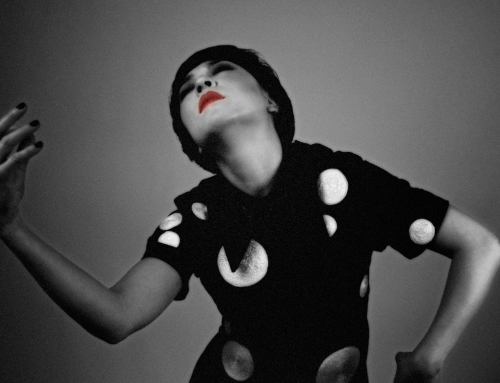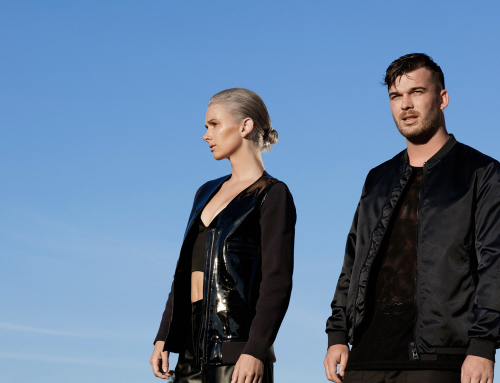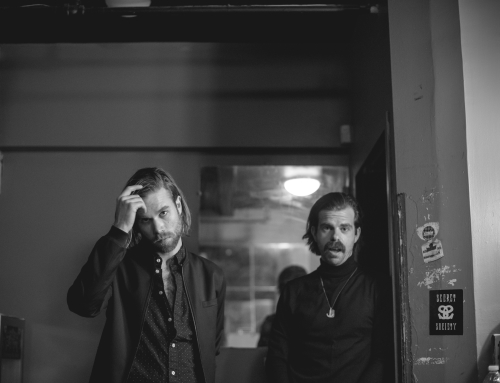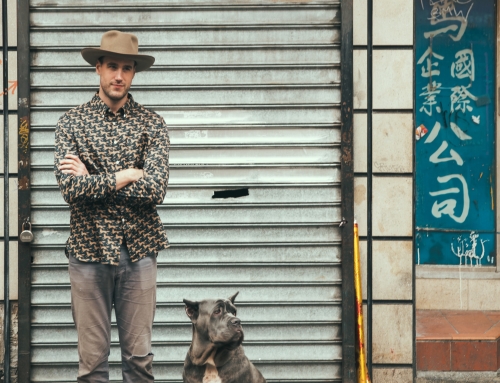Good things come in small packages — or on small stages in Anna Lunoe‘s case. An Australian musician, based out of Los Angeles, Lunoe is the DJ/producer/vocalist that has forward-listening audiences turning away from the main stage in herds.
While her preference is to play smaller clubs, Lunoe is no stranger to the big show; she spent last fall on a coast-to-coast North American tour with The Weeknd. Whether DJing with headliners or not, audiences are guaranteed the unexpected. “I won’t play any of those songs that are the biggest hits of the year,” says the musician. “Instead, I try to reference stuff that maybe people missed or is the next wave ahead.”
Evidently a music aficionado (she’s currently reading, David Byrne’s How Music Works), Lunoe’s passion for music first took form as an interest in journalism when younger. But, as it were, that interest quickly dwindled after the aspiring journalist found herself stuck in the world of TV, faced with interviewing too many bands she could only categorize as “lame.”
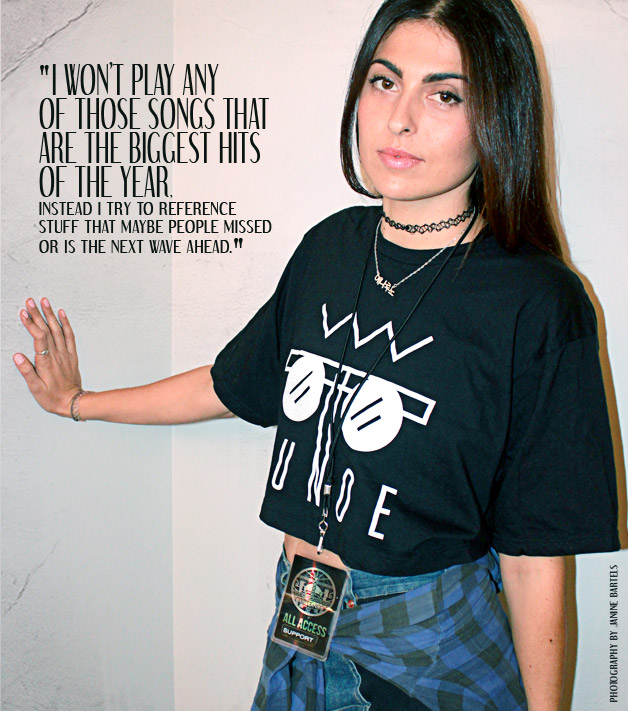
From here, Lunoe‘s career shifted to radio and towards curating on-air listening comprised of the “coolest” and “freshest” acts on the scene. “It was such a great up-and-coming station,” she gushes of her past employer. “It was a really exciting place to interview bands.”
Today, Lunoe is her own prized commodity: a distinct DJ, producer and vocalist. For her, making music and musical collaborations — like lending vocals to a track by fellow Aussie musician Flume — are about representing her individual style, not following the pack. “I would rather experiment on other stuff that is very forward thinking,” she shares.
A music maverick steadily taking over playlists the globe around (see her latest release, a remix package of last year’s single “Breathe” available at Beatport), we caught up with Lunoe to talk her definition of EDM and the rave scene, the evolving musical landscape in the digital age, and the challenges of being a female in a male dominated industry.

I hear your family is pretty musically inclined and that music has been a lifelong passion of yours. Was working in the business something you aspired to growing up?
I used to think that I wanted to be a music journalist…interviewing bands. And I did that on the radio station and for other stations in my early days in music…and I still think that would be fun, but I found quickly that my musical taste moved too fast, and all the bands that I was able to interview for the TV station were daggy…because I thought I was pretty cool, and that I was into all these hip new bands that they hadn’t heard of, so I was like, “I don’t want to interview that band, they’re lame.” That’s what stopped me from liking music journalism at the time, I wanted to interview bands that I thought were exciting.
Was your career in DJing something you just fell into, or was that always the direction you were heading?
I have definitely strived to do DJing, I have worked so hard to make a name for myself in DJing, so the answer is definitely yes.
Last year, in an interview I did with DJ Zen Freeman, he commented how he was “amazed to hear so many of the same songs over a period of 6 hours,” when he played at Coachella. On that note, how do you make sure your sound stands out, and how much do you think you need to remix a song to — quite literally — add your own spin to it?
I understand what he is referencing, but I don’t find it is a huge problem for what I do because I do something a little bit different than the mainstream sound you hear at Coachella, but I do see it happening a lot.
Why do you think that is?
I guess that it’s you don’t know what’s going to happen when you arrive on the day, or know who is going to play what right before you get on stage, but I guess you know what the big songs are every season, and you just have to be aware of that. I mean, I don’t know how much to edit it, it depends; cause if you mix it a certain way you can really make it sound fresh.
It’s quite the feat I imagine to come up with something different with so many DJs playing a show.
I tend to avoid big events where it is DJ after DJ.
You write top-lines for collaborative tracks and your own music. I understand that this is something that you have started doing more of. Do you ever see yourself becoming more of a vocal artist? You play musical instruments too, correct?
Yeah, I don’t play well. I play piano and I play bass, and I can play enough to write, but would not be very keen to jump up and play a whole set on bass. Vocalist wise, I really enjoy doing vocals on my own track, and I enjoy collaborating on other peoples songs..but I find that with vocals, I only really want to work on stuff that I think I couldn’t do myself. I get sent a lot of stuff that sounds like what I might have been making last month or with a sound that I am really just not that into. I am not keen on doing stuff unless it feels like something that I would play in my sets.
Makes sense. Freeman also said, “EDM DJs have become the new rock stars.” And it really seems true. More and more musicians are collaborating with DJs to change up their sound. What are your views on these collaborations? Is it a way to get exposure in different genres?
Yeah, I think that it is really exciting, I think when done in the right way, it’s super cool, your know. I get really excited when I see a good pop artist. Cause you know there is all kinds of pop artists: there are pop artists that kind of just sing other peoples songs and are a product of their marketing team and everything, but there are other pop artists that are amazing vocalists and actually have a really cool vision…like No Doubt working with Major Lazor, I was really excited about that. So I think I am definitely pro the EDM collaboation thing — when it’s done right, it’s super cool and it’s super exciting and inspiring just to see people you’ve worked with for years on scene — what you thought was a separate thing to pop music.
It’s really crossed over.
It is cool to see it having an influence over the mainstream culture, over pop music in general — like that Diplo track with Chris Brown was amazing, that was so much fun and a really good collaboration. But then you see other ones that are a bit daft, but what are you going to do? You got to take the good with the bad.
That becomes more and more true as the scene grows. Would you say the EDM scene and the rave scene are pretty much one these days?
The rave scene is separate from the EDM scene. When people say EDM, that to me references mainstream house music. Rave to me feels like a totally different thing: EDM feels like the kind of thing that happens in bottle service clubs in Vegas, like a kind of big super-club vibe. Rave to me still means an old fashion warehouse-y rave vibe, where it is more about the music, more about underground house music, crazy rave culture. I still see that as being separate, so that is my view on that.
Do you think of yourself as an EDM DJ?
I don’t really consider myself an EDM DJ, I think I am a little bit left of center of that, so the clubs I play are usually a little bit quirkier than the main room clubs, or I will play the side room, or I will play at a more underground house spot where I can play more of my own stuff. Having said that, I have totally played EDM clubs as well, but I prefer to play the more underground side of things or the more quirky side of things.
We like those types of clubs as well. How does the scene in North America compare to Australia?
Well, everything is bigger here. The Australian club scene is very young; you can be 18 in a club in Australia. So just through that everyone is three years younger, by the time you’re 22, you probably stop going to a lot of the clubs, so the music is very young and very much focused at that type of consumer.
Let’s talk a bit about the “customer” or music audience. In an interview with Nashville Nights you said that, “The way we have consumed music has changed.” Can you expand on this?
I see it historically forming. Look at the U.K. garage [scene] for instance: it’s almost like a few communities start this sound — a few producers in a community start a sound; they are playing it in the clubs, it becomes a little community of people who like this type [of sound], and a club that might represent that, and just a few key DJs that push a sound. Then blogs form around it, and journalism forms around it, and culture forms around it, and a fashion forms around it, and a movement. That’s how it used to form.
And now?
It’s like anyone can make any music and upload it at anytime, so that changes the impact of something because it can be made and consumed so quickly that maybe nothing ever forms around it, maybe there is never that community that forms around it. So that in itself is different because genres are more just like fads that happen when a bunch of producers go, “Oh, this sounds kind of hot, like trap music or whatever is kind of the hot thing, so we will all do that for six months.” Things go from being grassroots to being mainstream – they can go overnight!
Any examples you can think of?
Like you look at “Harlem Shake,” it’s like this underground song for three months, and then the mainstream gets hold of it and suddenly in two weeks everyone’s like, “Uh it’s not cool anymore because the mainstream knows about it.” The point of conception to tipping point is so short that it is really hard for something to take hold — to be something that people really get behind for an extended period of time, and that is different. Then there is also the fact that we don’t buy albums anymore, we just buy a song off iTunes. So that changes the money that’s behind music, that changes the kind of projects that record labels are working on because they are not looking to nurture a band like Radiohead, and give them a billion dollars every year to make an album and just hope that they become the artist they’re supposed to be. It’s like they think to themselves, “Okay, we need to make some money this year, people are only going to buy one song, so let’s make a song that is so universally acceptable that we can make as much money as possible.”
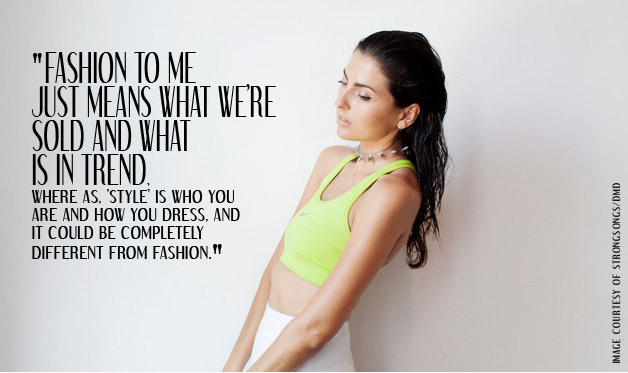
Not as nurturing from the sounds of it.
So that’s sort of more the way I think that there is less band development going on, or less money for band development, and so there are less bands pushing the boundaries of their sounds and moving forward. It is more a one shot, you get a record deal and you have one shot to make a record that’s going to crossover to the mainstream and be amazing…and credible.
That’s a lot of pressure for new bands.
I think it’s a little bit trickier for musicians to really make their mark, as well as that it is much more difficult for them to even make money because when people aren’t buying records. Having said that, I am definitely not the kind of person who is like, “everything sucks now, it was better before.” I’m just saying it’s creating a different music culture.
No, that’s a very valid observation. DJing and production appears to be a male dominated industry. Would you agree, and if yes, why do you think that is?
This is a big question! It is definitely a male dominated profession and that is for a huge amount of reasons — reasons that are too hectic for this interview. It is like social patents, and how people perceive women, and what they want to perceive women as. It’s more than just the fact it’s a male dominated industry, it’s the fact that it’s much harder for women to rise through the ranks.
How so?
There are other things that people are judging them by. A woman can’t just be super-talented, she has to be really attractive, and has to have all these other requirements on the card. I think it’s a combination of the fact that traditionally it’s a male domain and a lot of women aren’t seeing other women in high positions of DJing to be inspired by. I hope that slowly that will just change. I also think that society does not really want women in those positions just yet. I don’t think they are ready for it.
You’ve produced music for fashion houses including Chanel, Fendi, Prada and Louis Vuitton. In Interview magazine, you mention that you are, “More into popular culture than [you] are into fashion.” However, your music video “I Met You” has a fashion film influence. You may be more practical than Gaga or Katy Perry, but fashion obviously does play a role. Deadmau5 wears his mouse mask; do you have a stage signature or style, and is it important to have this?
I would say that style is very important. I would say that fashion is not important. Fashion to me just means what we’re sold and what is in trend. Where as “style” is who you are and how you dress, and it could be completely different from fashion. My answer would be, you got to have your thing in what you do, but it doesn’t have to be fashion — it can be whatever you want it to be.
Published January 16, 2014








